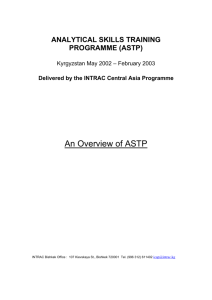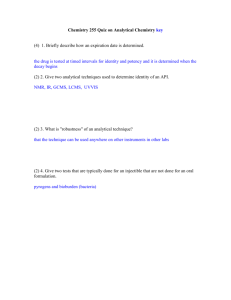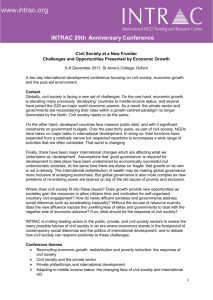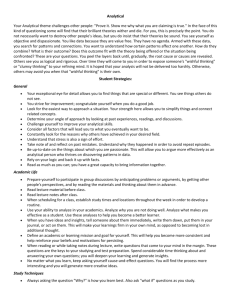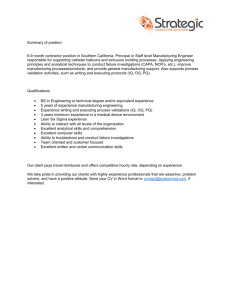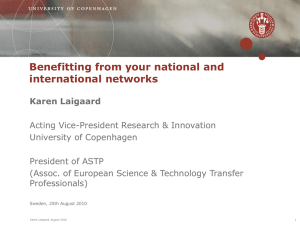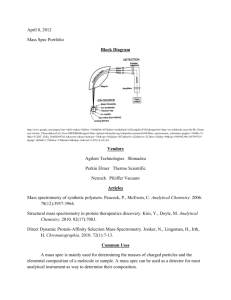Analytical Skills Training in Central Asia
advertisement
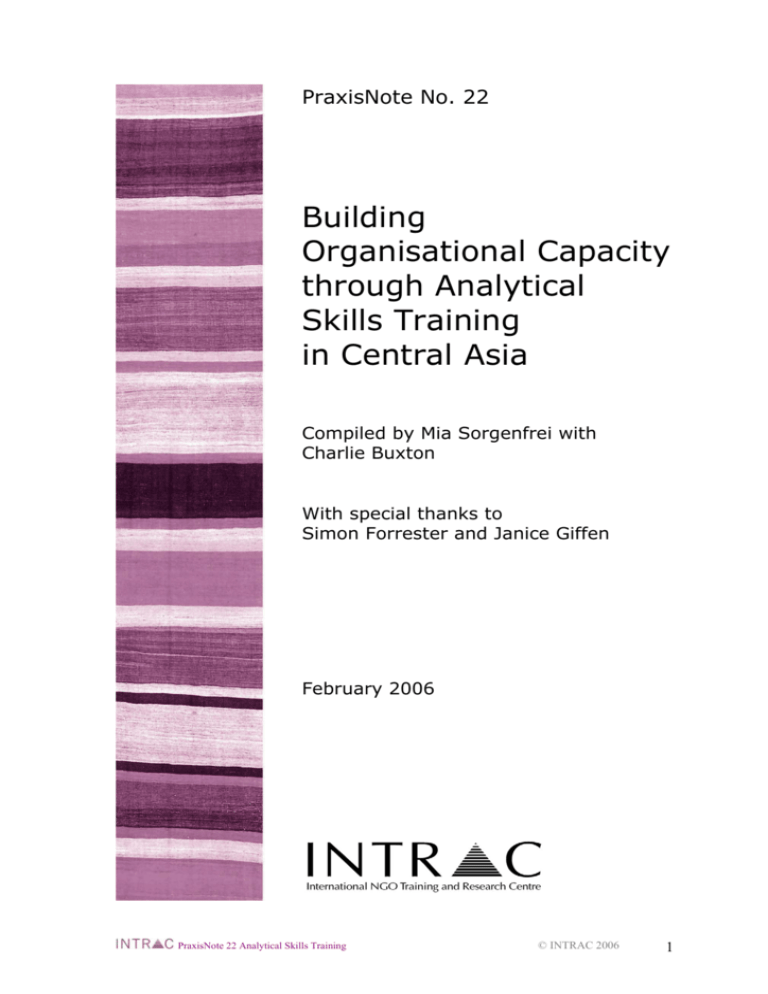
PraxisNote No. 22 Building Organisational Capacity through Analytical Skills Training in Central Asia Compiled by Mia Sorgenfrei with Charlie Buxton With special thanks to Simon Forrester and Janice Giffen February 2006 PraxisNote 22 Analytical Skills Training © INTRAC 2006 1 Building Organisational Capacity through Analytical Skills Training in Central Asia Keywords: Central Asia, analysis, research, analytical skills, capacity building, organisational capacity, learning, modular training, training programme There is growing recognition that weak analytical capacity prevents many civil society organisations (CSOs) from working effectively, and so it is important to explore how such capacity can be developed. CSOs need to draw on analysis to stimulate their processes of strategic reflection and organisational adaptation1. They can also improve their ways of working by analysing their practical experiences. The development of analytical capacity can help CSOs strengthen their relationships with different stakeholders. First, enhanced analytical capacity may enable CSOs to support their target groups more appropriately, based on a better understanding of their needs, and this may increase CSOs’ legitimacy with local constituents. Second, if CSOs engage more actively in evidence-based policy influencing informed by rigorous analysis, this may positively affect their credibility with government and donors. In addition, analytical capacity can help CSOs identify models and methods, for different organisational and programmatic purposes that are compatible with their mission, and adapt them to their specific culture and context. There is therefore a need to rethink capacity building interventions and develop approaches that will enable organisations to analyse critically their own work and the environment in which they operate. One way to strengthen the analytical capacity of CSOs is to build the analytical skills of their staff. The aim of this type of capacity building is to help individuals reflect more deeply on their work, compare it with other experiences, develop alternative and innovative strategies and approaches, make decisions after critical analysis and take ownership of implementation. It may also increase staff confidence in their own competencies, and help them realise that they can contribute to changing their own reality, as well as that of their organisation, and the society in which it is embedded. In this way, analytical skills training may help empower CSOs, improve their effectiveness, and hence increase the long-term impact of their work as well as their organisational sustainability. So, developing analytical skills may allow CSO practitioners to stand back from their reality, analyse the context in which they operate, understand the needs of their organisation and its stakeholders, and act strategically on this basis. Analytical skills include the capacity to: 1 See also Sorgenfrei and Wrigley: ‘Building Analytical and Adaptive Capacities for Organisational Effectiveness’, Praxis Paper 7 (December 2005). PraxisNote 22 Analytical Skills Training © INTRAC 2006 2 • • • • • • observe, listen and derive relevant information analyse data and reflect on implications for practice look at issues from many angles and recognise the value of different ways of thinking formulate old problems in new ways and raise questions acquire knowledge about, and develop new, theories and approaches be creative and think ‘outside the box’ In 2002–2004, INTRAC delivered an Analytical Skills Training Programme (ASTP) in three countries: Kyrgyzstan (2002), Kazakhstan (2003), and Tajikistan (2004). In each case INTRAC worked closely with a local NGO partner: with Human Resource Centre Tree of Life (Kyrgyzstan), Public Policy Resource Centre (Kazakhstan), and Centre Razvitie (Tajikistan) – all of whom contributed substantially to the programme. The purpose of the programme was to help CSO practitioners develop the capacity to reflect analytically and critically on their own work and the context in which their organisations operate, and to improve their efforts to empower communities to engage in policy influencing and achieve more sustainable development outcomes. This PraxisNote will provide insights into challenges involved in the delivery of analytical skills training in Central Asia as well as impacts which such training may have on the participants and the CSOs in which they work. Analysis in the Central Asian CSO Sector The deep social and economic crisis of the transition years and the swift pace of political change in many countries in the region has presented Central Asian PraxisNote 22 Analytical Skills Training CSOs with considerable challenges in scanning and analysing the external environment. However, only by regular analysis can CSOs pick up on opportunities arising and adjust to the changing needs of their target groups. However, many CSOs hesitate to engage in critical reflection due to limited resources, low confidence in their own capacity to analyse, or a sense of obligation to conform with donor conditions or government expectations. The CSO sector in Central Asia is still young. Many CSOs, based in an urban educated milieu, struggle to relate to target groups in the community or to keep pace with rapidly increasing poverty and disadvantage. While some CSOs were created in response to funding opportunities from external donors, others were founded as vehicles for individuals who previously had an outlet for their leadership qualities in Soviet state structures – for example in the education, health and scientific fields. At policy level CSO leaders struggle to make their arguments count with government officials, in a region where the state is accorded the key position in solving social problems – a heritage of the Soviet period. CSOs with strong links in the communities have usually emerged as a result of community mobilisation around one particular felt need or issue of common concern. They may initially develop the capacity to meet this need or to campaign about the particular issue on the local level, but subsequently find themselves unable to tackle wider issues or address them at the national level. For many CSO practitioners in Central Asia, especially those coming from an academic environment or hierarchical government services, learning to observe and work from the empirical experience of their own organisation is a first step to undertaking critical analysis. Most CSOs are able to collect information in a © INTRAC 2006 3 conscious and structured way, but organisational learning and adaptation rarely takes place in practice in a systematised form. Nonetheless, a few CSOs have integrated contextual analysis in their strategic planning and programme development, and now seek to strengthen analytical capacity for evidence-based policy influencing in order to inform and shape the institutional environment. In Central Asia, there are increasing opportunities for CSOs to be involved in policy dialogue, and CSOs themselves can contribute by networking, forming coalitions and engaging in advocacy work. Such organisations also need to develop their capacity to come up with innovative policy options or approaches that could be adopted by government. Frequently, foreign conceptual frameworks and methods promoted by donors are adopted uncritically, with little adaptation, by Central Asian CSOs. Some organisations do not fully understand the worldviews and theories underpinning these new imported approaches. Others may not apply the tools in the ways originally intended by those who developed them. It is important for CSOs to understand and adapt the approaches which they select to their own vision and strategy, or to reject them as inappropriate and develop their own. Challenging Traditional Forms of Analysis in Central Asia Central Asian organisations and institutions are influenced in different ways by the Soviet past (with its modernising, Marxist-Leninist agenda) and by the recent return to pre-Soviet traditions since the independence of all five countries of the region in 1991. The predominant culture rewards conformist behaviour and respects established power bases. Soviet educational and PraxisNote 22 Analytical Skills Training research institutions promoted forms of analysis based ‘scientific’ methods, typically using statistics. The institutional set-up has not always encouraged new and innovative ways of thinking and working. Analysis has traditionally been the monopoly of research institutions. Often, these institutions were encouraged to produce positive findings in support of the current political line. Non-conformist thinking and the open admission of failure were risky and discouraged by the political elite. In addition, the switch-over from a Soviet Marxist paradigm to the neoliberal approach of many international institutions and donors has not proceeded smoothly. Many institutions stick to the conservative approach where research is highly reliant on compilations of statistics and quantitative data2. While there have been major changes in the education system since the fall of the Soviet Union, these have been mainly in the development of private and marketoriented education, while public services have been starved of funds. The institutional base for new sociallyoriented and development thinking required by CSO practitioners is therefore weak. These people have had little schooling in critical thinking that could help them guide internal organisational learning and programme development or constructively engage with government and other actors. Many public sector academic researchers are dubious about the capacity of new competitors in the civil society sector to conduct research or analyse, and this has implications for the empowerment of CSO staff in this area. The need for analytical skills development in Central Asia differs from one organisation to another and from one country to the next. For 2 There are exceptions. For example Centre Interbilim notes that the American University in Bishkek has an Institute for Critical Thinking. © INTRAC 2006 4 example, the need to develop the analytical capacity of community-based organisations (CBOs) is more pronounced in Kyrgyzstan, while the need to strengthen the analytical capacity of CSOs for advocacy purposes seems more pertinent in Kazakhstan. This is closely related to the diverging political environments and economic situations in the Central Asian countries3. The social and economic differences between regions within each of the countries represented in this study are also likely to impact significantly on the needs for analytical capacity. The countries in which INTRAC’s Analytical Skills Training Programme has been delivered to date share a common history and current challenges. In all three Republics, understanding poverty is intertwined with understanding the dynamics of transition. These contextual considerations influenced the design of the ASTP, and the subsequent adaptation for the programme in each country. INTRAC’s Analytical Skills Training Programme (ASTP) INTRAC has been operating in Central Asia since 1994. The Central Asia Programme initially aimed to build the capacity of individual NGOs. But from 1997, INTRAC moved into institutional capacity building for the civil society sector as a whole, expanding to encompass the whole region from 2000, with funding from the British Government’s Department for International Development (DFID). One of the strands of this work was helping individual organisations to 3 While Kyrgyzstan and Tajikistan are among the poorest countries in Central Asia and both receive development assistance, with corresponding opportunities for CBOs, Kazakhstan is currently considered a middle-income country and CSOs have the opportunity and need to engage with national government policy change and funds. . PraxisNote 22 Analytical Skills Training understand their role in development processes in general, and in deepening their engagement with the poverty reduction strategy process (PRSP) in particular. The Analytical Skills Training Programme (ASTP) was designed as a modular training course, following the success of its predecessor, the Education, Training and Support Programme (ESTP) – a pioneering capacity building exercise for NGO support organisations in the region, also delivered as five linked modules4. As indicated in the diagram below, the purpose of the ASTP was two-fold. While the first set of objectives relates to internal strategy and organisational issues, the second set of objectives focuses on the ability of CSOs to debate policy development with external stakeholders, using their experience and analysis of the situations affecting their target groups. ASTP Objectives Internal organisational learning Ability to engage in policy dialogue Develop the organisation’s skills to conduct investigations and appreciate the research carried out by others Develop critical thinking about the organisation’s projects/programmes Demonstrate the value of critical analysis in the search for improved policy making Provide support to enable the organisation to engage in policy dialogue/ advocacy Strengthen independent capacity among CSO/NGO sector to undertake research Increase the ability to develop evidence-based programming 4 The ESTP Programme was run by INTRAC in four Central Asian Republics between 1998 and 2003 (Kyrgyzstan 1998, Kazakhstan 2000, Uzbekistan 2002, Tajikistan 2003). This training programme aimed at building the capacity of NGOs and the skills of their staff more generally. The modules explored the role of NGOs in civil society and organisational capacity issues, as well as useful tools and methods for NGO practitioners, including project management and evaluation methodology. © INTRAC 2006 5 The capacity building practitioners who designed the ASTP course decided that the programme needed to help participants formulate research questions and carry out investigative research in an open, exploratory way. The way that research questions are formulated depends on a knowledge of prior theories and views of the world. The training therefore devoted some time at the beginning to developing a broader understanding of different theories of development and worldviews. The research findings were then used to reflect on, and potentially adjust, this initial view. This process can be illustrated by the following cycle: gathering information according to predetermined categories or paradigms. However, it was recognised that, in order for CSOs to make useful contributions to both programme improvement and policy debates, the focus of the training should not be confined to the analytical cycle. It was vital that the outcomes of the analysis were communicated to appropriate decision makers within the organisation and in wider community /public forums. Given the wide availability of information about particular research methods and tools available in statistical offices and in academic and research institutions, it was decided that the course should aim to fill a gap by concentrating on qualitative analytical methods. Delivery of Analytical Skills Training • Articulating the view of the world that we hold (theory) • Selecting approaches and methods to be used in investigating specific situations or issues (investigation) • Understanding the different ways of reflecting on the information and data collected (reflection & analysis) The process of reflection and analysis will feed back into the views we hold about the world (back to the theory again). This cycle involves a continuous process of conceptualising and reconceptualising, as opposed to merely PraxisNote 22 Analytical Skills Training Each ASTP course had between 15–20 participants. The criteria for selection included the requirement that participants should work in organisations engaged in civil society development or poverty alleviation programmes. Participants had to demonstrate practical research experience and an understanding of the value of taking a fresh look at their area of work. In the event, the course groups were quite different across the three countries: in Kyrgyzstan there was a cross-section of NGOs, in Kazakhstan a focus on CSOs from the poorer south of the country, while in Tajikistan a handful of NGO specialist research organisations were included. All participants were required to sign up for the whole course and to undertake a discrete piece of analysis to be completed before the final module. The training course consisted of five modules which took place over a period of six to nine months, with the © INTRAC 2006 6 provision of inter-module support. The modules were structured to explore the nature of analysis and develop the analytical skills of the participants. Each module focused on a topic, related concepts, and different analytical approaches (see below). To link the different modules, participants were given the opportunity to conduct their own piece of research relevant to the work of their organisation. Participants formulated their own research questions and developed appropriate methodologies for their investigation processes, supported by the local trainers. This enabled the participants to refine their methods of investigation throughout the training course. The content of the overall course was similar in all three countries, but contextualised through complementary local studies and material, provided largely through the local NGO partners. Module 1: Exploring Different Perspectives Module 1 served as an introductory module that set the scene for the following modules by recognising that there are different ways of looking at the world. It presented an overview of development theories, and looked at the objectivity of facts versus the idea of social construction of knowledge. The Six Thinking Hats exercise5 was used to illustrate different perspectives and ways of conceptualising issues. Related methods of analysis were explored such as social assessment, which takes into account the views of different stakeholders, and the particular characteristics of qualitative methods were studied. Finally, guidance was given on developing research questions to rigorously describe work the organisations were involved in (‘what?’, 5 This exercise in thinking in different ways was developed by Edward de Bono – for detailed explanation, see Sorgenfrei and Wrigley: ‘Building Analytical and Adaptive Capacities for Organisational Effectiveness’, Praxis Paper 7 (December 2005). PraxisNote 22 Analytical Skills Training ‘how?’, ‘why?’) and proposing hypotheses for examination (‘what if?’). Module 2: Understanding Poverty Module 2 presented different interpretations of the concept of ‘poverty’, explored the emergence and practice of social development and social impact assessment as a method of enquiry, and provided the opportunity to practise participatory tools for data collection. The poverty issue was crucial to the areas of work of most CSO staff participating in the training course. It was also a useful example for illustrating that topics can be analysed from different perspectives. Different definitions of poverty (both incomebased and non-income based), as well as different approaches to collecting data about poverty and analysing levels of poverty (e.g. the sustainable livelihoods approach) were examined. In addition, aspects such as social exclusion, vulnerability, gender-based poverty, and exposure to risk were explored, and the importance of getting the views of the poor was highlighted. Finally, participants shared initial suggestions for their individual research topics. Module 3: Examining Participation Module 3 looked at the questions of participation. This included an overview of the history of participatory methods, the movement from participation at project and programme level to participation at the level of policy debate, and current opportunities for civil society groups to engage with government on these issues. Furthermore, participatory methods of data collection were discussed, the benefits of involving target groups in research examined, and participation as a means for empowering our target groups explored. Support was also provided to individual participants in the © INTRAC 2006 7 development of their own research questions and methodologies, as participants were to carry out most of their research before Module 4. Module 4: Measuring and Analysing Data Module 4 concentrated on measurement tools (e.g. key questions to pose when measuring change) and methods for data analysis. The value of monitoring and evaluation was explored and different learning systems examined. This module also devoted time to approaches for analysing data (including ways of combining qualitative and quantitative techniques) and supported individuals in their own analysis. In addition, methods of disseminating findings were introduced. Consideration was given to the different methods of presentation of results, and the fact that different methods will be more appropriate for different audiences. Module 5: Presenting the Research Findings Module 5 led up to a mini-conference, where participants presented the results of their individual research projects. The purpose of this conference was to convince the visitors that CSOs had a valuable role to play in policy debate. Representatives from the CSO sector, the media, academic institutions, local and national government bodies, and donor agencies were invited to attend the presentations of the research findings. They participated in feedback discussions on both findings and methodology. In each of the three countries, the presentations generated a lot of enthusiasm both among the participants who presented their findings and their visitors. PraxisNote 22 Analytical Skills Training Examining the Impacts of Analytical Skills Training In 2005, an exploratory study was carried out to obtain an understanding of the perceived and experienced impact of the ASTP. Interviews with selected training participants and trainers in Kyrgyzstan, Kazakhstan and Tajikistan were conducted by local consultants in Spring 2005. These were complemented by focus groups facilitated by INTRAC’s Praxis Programme in October 2005. The study provided insights into the impact of the training on the individuals, their organisations, and the wider environment. Initial findings indicated that the training had led to strengthened organisational capacity in the CSOs within which the training participants were working. The review suggested that the ASTP had: • • • • been a catalyst for dissemination and knowledge exchange amongst CSOs directly influenced the performance of CSOs by encouraging evidence-based programming and project design as well as enhanced strategic thinking enabled CSOs to‘re-position’ themselves in their locality as stronger and better informed advocates for change built the capacity of participants as individual change agents. In the sections below we give examples of how individual participants and their NGOs gained from ASTP. Catalysing Dissemination and Knowledge Exchange In all three countries, participants had shared the materials provided during the course with their colleagues, both in their own organisations and in partner organisations. In Kazakhstan, the © INTRAC 2006 8 Taldykorgan Women’s Support Centre ran a series of learning seminars based on the ASTP for their ten staff and invited counterparts from the local authorities. The Kyrgyz NGO, Atuul, held a seminar with members of their local network to discuss M&E issues, and disseminated materials about the concept of participation through the national network, Information Centres for Democracy Support. A number of participants have reported increased media coverage, achieved by presenting stories about local development challenges and writing articles on current development thinking. The application of peer-learning tools throughout the course also appears to have encouraged participating organisations to promote mutual exchange of knowledge and develop new inter-organisational links. In Kazakhstan, this manifested itself in the establishment of relationships between urban and rural CSOs, for example the women’s organisation Moldir began working with other ASTP participants on experimental projects with local government in rural areas. Improving CSO Performance Many ASTP graduates noted that the training helped their organisations review the meaning of research and analysis. They now increasingly understand that the data collection process has to be based on stronger research questions, and that the analysis of findings should not be based on preconceived assumptions and arguments. For many organisations, this has meant that programme work and project design has become more evidence-based. It is also clear that the ASTP has increased the range of analytical skills available within participating organisations. The NGO ASTI (Association for the ScientificTechnical Intelligentsia) in Tajikistan reported that their organisation had PraxisNote 22 Analytical Skills Training been enriched by a broader ‘toolkit’ for analysis and an understanding within their organisation of the need for a more qualitative approach to their research. Moldir in Kazakhstan noted that they have obtained a better understanding of the place of micro-finance in their work: previously, micro-credits were distributed with little analysis of the impact on target groups. However, after completing the ASTP, a participant assisted her colleagues in measuring how micro-credit provision has affected the quality of life of the recipients. Furthermore, the exposure to different ways of analysing has helped demystify theoretical frameworks and models. One participant in Kyrgyzstan reexamined Maslow’s Hierarchy of Needs6 to illustrate the differences between perceptions of poverty between elderly people in urban and rural areas. Other participants helped their organisations with a strong poverty reduction focus to review how they measure changes in poor families and communities, for example using the sustainable livelihoods analysis in Kyrgyzstan to adapt their approach to capacity building of self-help groups. Taldykorgan Women’s Support Centre in Kazakhstan stated that their approach to analysis of poverty reduction policy changed after the ASTP. In particular, they had become more aware of the need to change people’s mentality, to empower them and strengthen their potential to develop. The examination of participatory approaches to research has also strengthened relationship building with vulnerable groups. Following the ASTP, NGO Cooperation for Development in Tajikistan undertook research into the role of women in the cotton growing 6 Maslow’s hierarchy of needs includes: physiological needs as well as the need for safety, love, esteem, and selfactualisation. © INTRAC 2006 9 industry. They then met with cotton workers to discuss the findings. ASTI believed that participating in the ASTP has made them more attractive to potential clients in Tajkistan and they attribute an increase in research consultancies for both local and international organisations to their ASTP attendance. This has also been the case for Atuul in Kyrgyzstan whose leader stated that ASTP boosted their confidence and organisational credibility, ensuring better access to information and more receptive responses from potential partners and funders. The women’s organisation Alga, also from Kyrgyzstan, reported that they had obtained funding for research and innovative projects. In both these cases, a stronger organisational profile was linked to better analytical capacity. Many other ASTP graduates report that they have used newly acquired skills to analyse and revise the strategies of their organisations. The Union of Women Artists in Kyrgyzstan explained that prior to the ASTP, their planning was primarily based on intuition, while analysis now structures their work and they use monitoring and evaluation more thoroughly to check whether they are ‘moving in the right direction’. NGO Legal Initiative from Kazakhstan found that the ASTP created impetus for strategic planning and programme development. The organisation has changed its way of operating, and now uses SWOT7 analysis to analyse individual programmes and develop strategies. In Alga, all organisational strategies were revised after the ASTP. They started to engage in more longterm strategic thinking, picking up on indications in the environment that donors might begin to withdraw from Central Asia and that they might need to seek more support from local 7 Strengths, weaknesses, opportunities and threats. PraxisNote 22 Analytical Skills Training government in the future. On the programme level, their range of support services was expanded to include microcredit, training and consultancy for selfhelp groups). ASTP has inspired Alga to experiment with innovative projects, for example looking at local budgeting from a gender perspective. Building the Capacity to Advocate for Change As one Kazakh participant noted, the improved performance of NGOs participating in the ASTP in Kazakhstan has helped ‘break the myth of analytical illiteracy of NGOs’. Since the final module, several participating organisations have collaborated more with local authorities. For example, the Consumers’ League reported that the ASTP had revolutionised the way they approached their advocacy work. The knowledge from the course and interaction with other participants demonstrated to the League the need for their campaigns to fit within a wider framework and to ensure that the presentation of research findings was accompanied by real life stories as opposed to bland statistics only. Legal Initiative explained that their changed understanding of poverty (which includes the lack of rights and opportunities to influence one’s future) led them to engage more in advocacy activities, take opportunities to influence human rights, and inform the population through the mass media. In Kyrgyzstan, Atuul applied learning from the ASTP to build the capacity of an advocacy network of eight local NGOs. This network has since started joint work on a project entitled ‘Transparent Kenesh’8. Several ASTP participants have been involved in organising public hearings, inspired by a stakeholder meeting held during the course. 8 Kenesh is the Kyrgyz word for parliament. © INTRAC 2006 10 Creating Individual Change Agents Building Analytical Skills of CBOs Many ASTP graduates explained how their greater individual analytical skills, confidence and knowledge have led them to promote change through professional relationships at the individual level. One graduate from Kyrgyzstan continuously draws on the ASTP experience in advisory work with NGO clients and has succeeded in conveying aspects of livelihoods analysis to CBOs in southern Kyrgyzstan, enabling them to change the way they monitor their own work. She made the observation that ASTP has helped her view target groups (as opposed to NGO practitioners) as the ‘experts’, as they know most about their own needs and situations. The staff member from the women’s organisation Alga in Kyrgyzstan who participated in INTRAC’s training programme subsequently trained her colleagues and shared the materials with them. The organisation has since applied this knowledge to build the analytical skills of community-based organisations (CBOs). Alga trains young women from the local communities as community facilitators. They return to work with women’s groups in their own or neighbouring communities to help them identify, analyse, and address the most critical needs of the group or the community. The methodology used includes case studies based on real experiences in the local communities. Another Kyrgyz participant, from the Union of Women Artists, reported how her challenges to existing teaching practices in an art college, based on an assessment of students’ needs, resulted in curriculum changes. The local trainer from the ASTP in Kazakhstan observed that participants were able to use knowledge acquired during the course in their own activities as trainers, and hence to influence reflection on social development generally. Finally, a participant from Alga convinced her colleagues of the value of analytical skills development by demonstrating it in practice (see text box on the right). 1. a demographic overview of their community 2. a list of the principal social problems 3. a strategic plan for how the group intends to solve these problems in the near future PraxisNote 22 Analytical Skills Training Stage 1 - The women’s groups complete questionnaires from Alga with: The women’s groups are encouraged to explore their problems, including main causes and consequences, look at them from different angles, and prioritise them according to importance and urgency. Alga sees this as important, because the women’s organisation may have a different understanding of the issues than the selfhelp groups). Stage 2 - An analysis of the situation, including actors and conditions in the environment that impact on the issues raised, is carried out jointly by Alga and the group in question, and appropriate solutions are developed. The women are encouraged to be open-minded and avoid limiting themselves to focusing on one option only. The proposed solution is then tested through an analysis of strengths, weaknesses, opportunities and threats, and structured in an action plan with different phases. © INTRAC 2006 11 A summary of the benefits of analytical skills training for organisation performance and future challenges for capacity building practice is presented in Appendices 1 and 2. It should be noted that the impacts indicated above are all positive. Throughout the review process, it proved difficult to identify negative impacts, perhaps because informants were hesitant about criticising INTRAC’s training programme. There was widespread consensus that analytical skills training is badly needed in Central Asia. However, the next section does include some suggestions from participants about how the training could be improved. Reflections on Training Process and Content Pre-Training: Purpose, Course Design, and Selection of Participants Exposure to Research Methods or Analytical Skills Development? A key issue which came up regularly was the ambiguous or double purpose of the programme. While the original aim of INTRAC’s training concept was to help build research skills, the training design and content gradually evolved towards analysis in its broader sense, based on the recognition that above all, NGOs in Central Asia needed analytical skills and the capacity to think critically, as this would help them select relevant methods for analysis or research and apply them appropriately. In the review, respondents with research backgrounds (particularly those from research NGOs in Tajikistan) focused on the research methods and tools they had been exposed to during the course, rather than their increased analytical ability. The combination of experienced researchers with an academic background and less experienced participants in more junior positions in PraxisNote 22 Analytical Skills Training their organisations, caused some frustration. Some respondents suggested that the criteria for selection should be reviewed to ensure that participants had the capacity to apply research methods appropriately. In this we can see the heritage of a ‘scientific’ approach to research. These respondents felt that CSOs should not let ‘inexperienced’ staff carry out research, as this would undermine the reputation of their organisations as well as the sector as a whole. However, the findings of this study indicate that in fact it was easier for less experienced participants to adopt the ideas that INTRAC proposed, as they did not have to unlearn their preconceived notions of research and analysis. A Modular and Flexible Approach The modular approach of the ASTP training course made it possible for participants to increase their analytical capacity gradually, from one module to the next, as they learned from their experiences. This was perceived as useful by participants, as it allowed them to raise questions that were discussed collectively during the next module. INTRAC’s approach was generally characterised by the informants as holistic, adapted to the particular context, and responding to the needs of the specific group of participants in question. Many participants had previous experience with ‘off-the-shelf’ training courses for NGOs which relied on standardised materials without adaption to the level of participant skills and knowledge. The modular nature of INTRAC’s programme, taking place over a six-month period, was in stark contrast to the prevalent donor focus on short-term inputs and results. It was highlighted as very positive that the responsive nature of the course allowed participants to be challenged and engage in different ways, depending on their individual backgrounds, needs, and © INTRAC 2006 12 levels of understanding. Many participants said that INTRAC’s approach was so new for the region that they had had to review their ways of working and thinking (both with respect to theory, practice, and analytical methodology). A key aspect of flexibility was the contextualisation of the programme. The combination of international and local trainers, as well as INTRAC’s local foundation in Central Asia9, helped ensure that while participants were introduced to ideas, methods and tools from outside Central Asia, the training content was rooted in the local context. The NGO partners Tree of Life, Public Policy Resource Centre and Centre Razvitie, contributed both organisational knowledge and specialisation, and the skills of individual trainers. They helped INTRAC to ensure that course materials were sourced both internationally and locally. Considerable editing and translation was carried out to ensure accessibility. An indication that this approach was appropriate to the context is that the modular training approach and many ASTP materials were adapted for courses carried out subsequently by ASTP participants. However, it should be noted that local trainers felt a more systematic approach could have improved the blend of international and local outputs. Also, a contextual issue little acknowledged by ASTP was the prevailing perceptions of gender issues in Central Asia10. Training Delivery Distinguishing between Research and Analysis Throughout the training programme, it proved difficult to distinguish between 9 INTRAC offices with local staff in Almaty and Bishkek. There is a strongly held and perhaps uncriticial view that the Soviet era fully addressed gender inequality, while aspects of traditionally patriarchical society sometimes fail to be recognised. 10 PraxisNote 22 Analytical Skills Training the terms ‘research’ and ‘analysis’. This was partly due to INTRAC’s own double approach, and partly due to the difficulties in the translation of key terms into Russian. Furthermore, the prevailing formal and ‘scientific/objective’ approach to research in Central Asia continued to cause problems for other, new approaches not based on the collection of large amounts of statistical data11. As previously mentioned, the reluctance among academics in Central Asia to accept research undertaken by CSOs as credible, puts pressure on CSO staff, whose confidence in their own analytical skills may be already low, to produce research findings of high quality. This was highlighted by the responses of external stakeholders invited to the conference held during the last ASTP training module. They had been told that findings from research on poverty reduction would be presented. However, since their approach to analysis and research was so different from that presented in ASTP, many questioned the validity of the studies carried out by participants. Some informants in our study were concerned that this difference of approach would lead to doubts about the credibility of the organisations participating in the ASTP. It is possible that expectations could have been kept at a more realistic level, if the purpose of the training course had been communicated differently to the invitees, but the main issue appeared to be very different notions of research and analysis held by facilitators, participants and invitees. However, it should be seen as a major achievement that ASTP contributed to shifting the participants’ understanding in this area and that the analytical skills training, as well as the research projects which they carried out, helped them demystify both analysis and research. As one participant explained, 11 Such as the use of participatory or qualitative approaches. © INTRAC 2006 13 ASTP helped simplify complicated issues and develop concrete solutions. Balancing Theory and Practice It was a challenge for the training facilitators to manage the tension between providing sufficient space and depth of material to discuss development thinking and the nature of analysis, on the one hand; and the time and resources required to support participants in conducting their own analysis and individual research projects, on the other. The pressure to produce concrete outputs to some extent prevented participants from taking on board the wider message of the course about how to approach analysis. The emphasis on practice was reinforced through the use of outside speakers and panellists in some modules, describing how they apply the concepts and approaches in their own work. As mentioned above, the final workshop was devoted to the presentation of participants’ own analyses with invited guests from government, civil society, and, in some countries, the private sector. There was general consensus that the discussions and debates around these studies made the last module among the most successful in the programme. Managing the Learning Process The content of the first modules seemed too ambitious to some participants who did not feel they fully understood the proposed approach to analysis until the last modules. However, the advantage of the modular training course structure was that it supported an ongoing learning process by providing opportunities to apply ideas and methods between modules. The local trainers played the key role here. Mechanisms for peer learning and sharing, for example in the form of PraxisNote 22 Analytical Skills Training group work, helped support participants in the gradual learning process of applying analysis in their own organisations. Many participants also conferred with each other between modules. Consultation was provided between modules, for small groups and individually, to help participants understand course content, discuss issues arising, and provide guidance on the practical application of what they had learnt during the workshops. Some trainers felt that the mentoring of each individual participant between modules could have been provided more pro-actively if local trainers had been funded more consistently to visit participants in their organisations to discuss their pieces of research. Where this happened, participants felt better supported (some mentioned the importance of ‘moral support’) and seemed more committed in their investigations. Post-Training: ExperienceSharing and Follow-Up Experience Sharing Several participants returned to their organisations with increased confidence in their analytical capacity, and a strong motivation to share their newly gained insights, either through the dissemination of ASTP materials or by training of colleagues. However, it was not always easy to stimulate colleagues to take an interest. Some succeeded in attracting the interest of other staff by using the acquired analytical skills in their work with target groups and demonstrating its effectiveness. Shared learning within the participating organisations has also been impeded by high staff turnover. Several ASTP participants have already moved on from the organisations involved in the training programme. However, it would seem that many of these individuals © INTRAC 2006 14 continue to use their knowledge and skills in their new employment, and this is becoming a channel through which the understanding of analysis as well as the development of analysis may spread. After the training period, a small informal network was established by ASTP participants, who still communicate and use the same methodology. They often find it useful to exchange ideas and lessons, although it is not always possible, as the individual organisations, their level of experience and development, their programmes, and the regions in which they are located are very different. This suggests that the idea of communities of practice originally introduced in the ESTP Programme12 and reappearing as an element of the ASTP could have been pursued more actively as part of the follow-up post-training. Follow-Up is Essential Follow-up is one aspect of ASTP that could usefully have been prioritised more. While mentoring support by the country manager in INTRAC’s office in Kyrgyzstan was highlighted as valuable by certain participants, it is clear that the closure of INTRAC’s office in Kazakhstan had a negative impact on the extent to which Kazakh ASTP participants felt they had been able to continue developing their analytical skills. By contrast, ASTP worked well in Tajikistan despite the absence of an INTRAC office in that country; this was due to the good work of the local NGO partner and trainers. One suggestion for improving mentoring and follow-up mentioned by a respondent was the inclusion of a distance-learning element. During the review process, INTRAC was urged by informants from both Kyrgyzstan and Kazakhstan to continue ASTP training at a more advanced level, or alternatively to repeat the first modules for staff from NGOs that had 12 not previously been able to attend. It was felt that learning exchanges between countries in the region could have been encouraged and supported more. It was noted that ASTP participants who later attended other INTRAC courses (in such areas as orgnanisational development and monitoring and evaluation), and were involved in other regional exchanges organised by INTRAC, had found these activities helpful in applying the learning from the ASTP modules and further strengthening their analytical skills. Finally, it was suggested that an ASTP post-graduate scheme might be established through which participating organisations could be stimulated to network and market research services. Epilogue As the DFID funding for INTRAC’s Central Asia Programme came to an end, INTRAC closed its office in Kazakhstan and therefore follow-up for participants here was perceived as minimal. In Kyrgyzstan, by contrast, several participants emphasised that they felt supported by local INTRAC staff to continue developing their analytical skills after the training course; and in Tajikistan there were lesser expectations for support but many benefits nonetheless. There was consensus among participants across all three countries that follow-up modular training courses were needed (both similar courses for new participants, and a more advanced course), and that INTRAC had left a vacuum behind that no other support organisation had since been willing or able to address. See page 5. PraxisNote 22 Analytical Skills Training © INTRAC 2006 15 Appendix 1: Improvements in Organisational Performance brought about through ASTP • • Organisational Strategy and Learning • • • • • • Demystification of the notion of research, increased organisational understanding of concepts such as poverty and change, empowerment and participation Enhanced long-term strategic thinking, based on the recognition that there are alternative ways of viewing and addressing challenges Strengthened capacity to observe the interaction between the organisation and its environment, and capture complex situations in simple and accessible ways, for analysis and communication of findings Combined intuitive and analytical assessment prior to strategy development, greater capacity to prioritise and obtain a strategic focus Increased confidence to take independent initiatives and engage in analysis for the development of innovative and experimental programmes/ projects Analytical understanding and approaches shared with colleagues, target groups, and other CSOs • • • Relationship Building and Policy Influencing • • Programme Delivery and Performance • • Shift to evidence-based programming and project design, informed by more relevant data collection and stronger analysis of the data gathered Adoption of qualitative and participatory approaches to research as well as acquisition, critical adjustment and application of analytical tools PraxisNote 22 Analytical Skills Training Raised awareness of alternative ways of working, and the need for triangulation of different methods More complex understanding of poverty and exclusion helped facilitate the empowerment of target groups in the communities More appropriate programme delivery based on needs assessment and consultation with target groups, followed by problem identification as well as the development of practical and concrete solutions Training design inspired by INTRAC’s training approach (modular, analytical) Improved ability to monitor, evaluate, and measure the impact of development work on the quality of life in communities • • Stronger organisational profiling as credible and well-informed organisations capable of critical analysis Awareness of the need to build relationships with stakeholders has led to: a) Improved communication with the community groups receiving support b) Improved quality of information disseminated to the media and increased media exposure c) Increased recognition by donor agencies and government institutions resulting in funding opportunities and collaborative initiatives. Inter-organisational knowledge exchange and dissemination of promising practices for mutual learning Established CSO networks for evidence-based policy influencing © INTRAC 2006 16 Appendix 2: Future Challenges for Capacity Building Practice Many participants felt that it would be useful to explore further how such skills can be applied in practice beyond the scope of individual research projects. For example: • How to use critical thinking to select and adapt methods and models appropriately to the local context? • How to assess what forms of relationship building are effective and why? Based on an understanding of complex relationships, tensions, and conflicts, and using tools from the ASTP to carry out exercises such as stakeholder analysis and social mapping. • How to stimulate collective analysis in networks? There is increasing recognition in Central Asia that small peer networks are effective mechanisms for sharing learning. • How to ensure that the impact of analytical training spreads beyond individuals to organisations? e.g. by encouraging participants to share their acquired learning upon their return to their organisations. References Interviews and Focus Groups Kyrgyzstan: Alga, Help Age International, Tree of Life, Center Interbilim, Atuul, The Union of Women Artists Kazakhstan: Moldir, Legal Initiative, Casdin, Taldykorgan Women’s Support Centre, Consumers’ League Tajikistan: ASTI, NGO Cooperation for Development, Centre Razvitie PraxisNote 22 Analytical Skills Training Resource Documents Forrester, Simon: ‘Towards a Case Study Input into the PraxisNote on Building Organisational Capacity Through Organisational Skills Development’, INTRAC March 2005 (internal document) The information in this document by Simon Forrester (formerly Programme Manager in INTRAC Central Asia) is based on research conducted by local researchers in the 3 countries in February–March 2005 and secondary data held in the INTRAC Bishkek office. The local researchers were Marifat Abdulleava (an ASTP participant on the course in Kyrgyzstan and a local trainer for the courses in Kazakhstan and Tajikistan), Serik Ospanov (local trainer for the course in Kazakhstan), and Kulnara Djamankulova (INTRAC Central Asia Community Development Adviser and ASTP participant in Kazakhstan). Giffen, Janice: ‘Analytical Skills Training Programme’, INTRAC October 2004 (internal document) Senior Capacity Building Specialist Janice Giffen facilitated the analytical skills training courses in Tajikistan and Kyrgyzstan. This PraxisNote draws on an internal reflective document which she wrote after finishing the last training course. Other References Sorgenfrei, Mia and Wrigley, Rebecca: ‘Building Analytical and Adaptive Capacities for Organisational Effectiveness’, INTRAC Praxis Paper 7, December 2005. This Praxis Paper explores the nature of the analytical and adaptive capacities of CSOs, their mutual relationship, and their importance for organisational effectiveness. The paper is available to download from INTRAC’s website. Forrester, Simon: ‘ASTP – Kyrgyzstan to date and next steps for Kazakhstan’, INTRAC 2002 (internal document) Brubacher, Barbara: ‘Review of the Education and Training Support Programme in Central Asia’, INTRAC August 2004 (internal document) © INTRAC 2006 17

